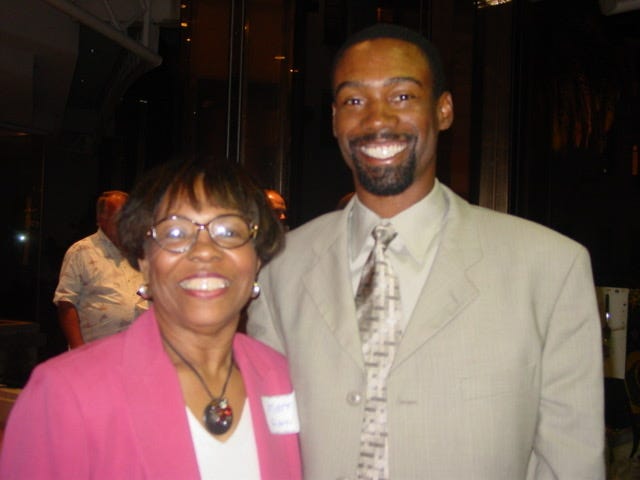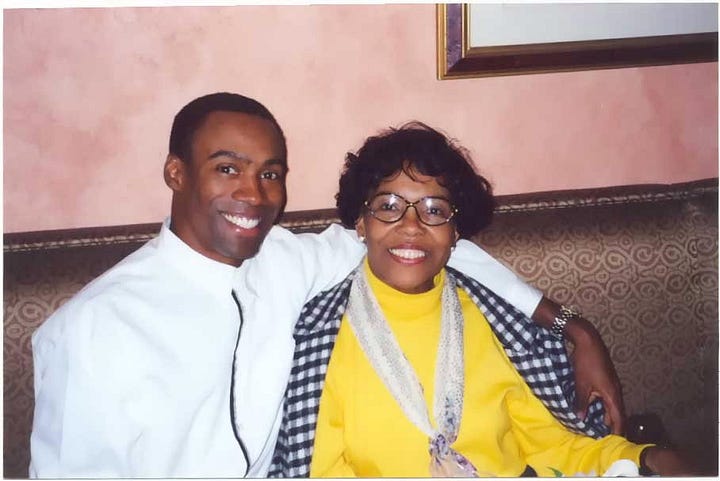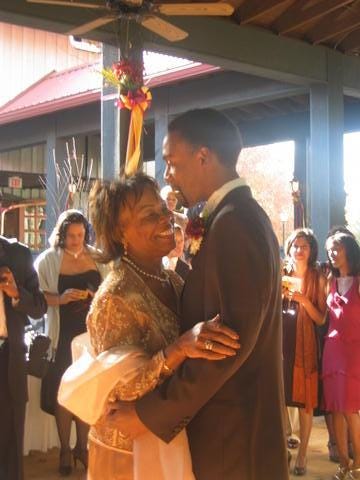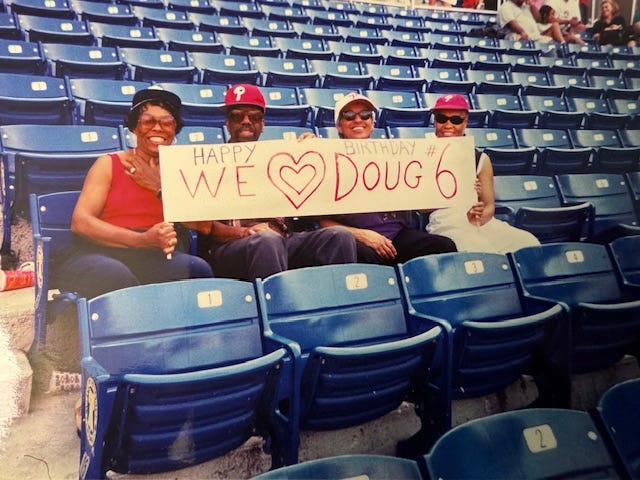



On a self-care day in my hometown of Teaneck, NJ, my mom went to her usual hair salon for an appointment. At the time, I was comfortably in the big leagues. The ink had dried on my new three-year contract, and for her, it meant her youngest had finally found security. It was the day she could exhale a little—her baby had launched.
That same day, in the same salon, a man was sitting in the waiting area while his wife finished her treatment. He read the newspaper and came across an article about me—the local kid playing in “the show.”
I was not playing well at the time. I was mired in a slow start, off from the levels I had reached during my 1999 season. The man scoffed and said aloud, within earshot of my mom:
“Typical. Once these guys get paid, they stop working.”
My mom told me she had learned to ignore comments like that over the years, but this time was different. This was her refuge—her hometown, her hair salon, her sanctuary from stress. That man had not just insulted her son; he had brought a toxin into her place of peace.
She decided that she could not let him get away with it.
“You don’t know what you are talking about,” she said, stunning him.
As she relayed the story, he looked confused, unsure why this stranger was challenging his opinion about a baseball player. Sure, it was risky to pop off in a player’s hometown. But what were the odds?
His confusion did not stop her from continuing. From there, she broke it down. Or as she put it, she “blessed him out.”
As a player, I always weighed my options in those moments. But I came to understand that my family had to weigh them too. Do you give up privacy to set the record straight? Do you risk turning a critic into an enemy?
That man could not have known the context for his offense. In simple terms, he trashed someone’s son. But in deeper terms, he spoke without knowing my father was slowly dying from a cascade of health issues that began during spring training—a stroke, cancer, diabetes, heart disease. It came in waves, year after year, and my mom had become a full-time caretaker.
In that role, self takes a back seat. Add parenting to the mix, and you might as well be sitting in the trunk. That hair appointment was a rare act of caring for herself first. To hear a stranger reduce my struggles to laziness was not just inaccurate. It was cruel.
She knew I was playing under a weight most could not see. She knew the toll it took. She understood how close I was to my father. My wordless bond with my father was as strong as our spoken one. It made suffering something we did in silence. When I saw my father after his first stroke, his speech was considerably compromised. It was like watching a poet lose his language. It was an interaction that will stay with me forever.
The journey of a major league baseball player is filled with unexpected twists and turns. At times, you feel a strange sensation of moving backward and forward all at once. You know from experience, and from the experience of your peers, that it is an inevitable part of the path. With that understanding, the way you perceive setbacks shifts. The dream of simply making it to the big leagues evolves into something deeper. You see the required work in the challenge of living, sustaining, and enduring that dream. That transition makes you feel the gravity of change differently.
As you grow from a raw talent into a seasoned professional, you begin to fully grasp how much your family has sacrificed to help you chase that dream.
For me, there was almost a rhythm to the way my mother supported and guided me throughout my career from the moment I was drafted. At first, she was worried that minor league baseball would not take kindly to her Ivy League-educated Black son. That I might seem too confident, too proud, too questioning. She feared the game would humble me too harshly, that it didn’t have room for someone like me unless I fit neatly into the story it wanted to tell rather than one I hoped to write for myself. In Low-A ball, my mother taught me how to make a quick chicken and rice casserole to share with my minor league roommates. In High-A ball, she teared up when I came home from my first full season twenty-five pounds lighter. In Double-A, on a rare off-day, she dragged me out of bed in Birmingham, Alabama, to spend a full day at the Civil Rights Institute. In Triple-A, she flew to Des Moines, Iowa, to make a home cooked meal for my birthday. My immediate family found me on every birthday. Chicago, Orlando, Iowa, it did not matter.
This says nothing of the insights, the patience, the family expectations. If I was near anyone from my extended family, I had to connect, to see them, or to invite them to a game. I had mini family reunions all over the country, even though I would be missing our annual one in September for as long as I wore a uniform.
And as parents know, the older your kids get, the bigger the problems. So my mom had plenty of major league advice as I played in Philadelphia, Chicago, Dallas, and every city in between.
On December 23, 1997, I was traded from the Cubs to the Phillies, my favorite childhood team. Less than 24 hours earlier, her father had passed away. After some time to grieve, it sunk in that I would be back in my college town and close to home, which felt right.
Until then, I took pride in needing just a couple of suitcases for the entire season. This was particularly convenient given you could be traded at a moment’s notice. After the season ended, it also allowed you to just walk out of the rented apartment, white walls and all, leaving the rented furniture behind. My life fit in the trunk of a sports car.
But when I got my apartment in Philly, things started changing. After each road trip, my apartment looked a little different. Where did that plant come from? I thought that wall was white? Did I rent this coffee table?
By the time the season ended, I needed boxes, movers, and a much bigger vehicle. Where did all this stuff come from?
Mom.
She kept saying, ”These white walls are no way to live.”
I started to notice something else every time I went home. The innocuous insider questions began to slip into our conversations sounding something like…
“Did you hear that Bernie Williams is on the trade block?”
“What? Where did you hear that?”
“I read it in the paper.”
She was studying up.
Before long, I had to admit that she knew more about the behind-the-scenes game than I did. I started wondering if I should ask her if I was getting traded. Who needed an agent?
My older brother inspired and taught me to play baseball, so she had a head start on the game’s politics, but when I was in the majors, she took it to another level. She was determined to fully understand the game, the environment I was in, and the people around me. Being in New Jersey close to George Steinbrenner and the Yankees, she learned about private investigators, dugout fights, firings, and trade rumors. Then came conversations about backdoor sliders and hitting the cut off man.
Of course, as her son, I wondered if she knew too much, knew when I was pulling off with my front side or when my top hand wasn’t firing. Is that a good thing?
When I arrived in Philadelphia, she broke down my teammates to a tee. How Jimmy Rollins used his size to his advantage in the field and on the bases. How Bobby Abreu’s patience always paid off at the plate. And she kept her eye on questionable influencers floating around our social scene.
Through the heart of my Phillies career, I watched her single-handedly keep my father alive. In and out of ERs, a roster of doctors, notetaking, and schedules. She coordinated phone calls and in-person visits that held everyone accountable, but somehow she found time to keep up with the world of baseball.
In 2002, on the final day of the season, I recorded the 1,000th hit of my career, and that same day my father passed away back home in New Jersey. I became a free agent soon after and signed with Texas. She supported it, though I told my manager, Buck Showalter, that my mom was not thrilled I would be this far from home. So he made sure I was on the cover of the Rangers program during Opening Week. Even Buck knew not to mess with Momma.
Two weeks into the season, I tore a hamstring tendon. Mom flew down, drove me to appointments, and told me, “You are moving like an old man without those crutches.”
“In baseball, 32 going on 33 is pretty old,” I replied. Still, I was healing fairly quickly.
When I returned to Philly as a free agent, I met my future wife. I invited her to a game when my mom would be there. Given how early in the relationship we were at the time, my wife did not know how to introduce herself. That is when I learned the importance of giving someone a little lead time before they meet Mom.
Eventually, I retired from baseball in an on-field ceremony in Philadelphia with my mom and fiancée in the dugout.
My mom has been there the entire time. At 88 years young, she still understands the game inside and out. She has always seemed to have an uncanny baseball intuition. An ability to read relationships, understand coaching, and speak her mind to any manager. They knew her well, and they knew when she was coming. The message was always clear: take care of my son. Period.
The miles she travelled are uncountable, all while being the glue for our extended family and serving in my hometown school system as a long-time teacher.
It feels like my mom was everywhere during my career. Whenever I think of a city or a ballpark, she seems to have been there. She always had a word of encouragement, a relationship tidbit, or a nudge in the right direction. This seemed to come from out of nowhere. But it was always timely.
This Mother’s Day, I want to honor my mother for how she turned baseball into a classroom, using it to teach what it means to have character, how to be an exceptional parent and a dedicated partner to others. She brilliantly found baseball to be another chalkboard, a canvas to share life’s lessons. She used the game’s rhythm—its patience, its relentlessness—as a teaching tool. She showed every day and in every way, and she took on my baseball family as her family.
I saw that same devotion in how she cared for my father. In how she fought for fairness and equality in education. And in how she adapted to my dream, making it her own, and never stopped guiding me even after I retired from the game.
This Mother’s Day, I hope she treats herself to a spa day once again. And this time, I hope her sanctuary remains uninterrupted and peaceful, free from careless words of judgment.
After all, it has been a long time since I stepped into that batter’s box with the weight of those dreams on both our shoulders. And I am thankful that my mom was right there with me all along—steady and unwavering.
Happy Mother’s Day, Mom.





Great tribute to a great mother and teacher. Always have to appreciate what moms do for us from that first drive to Phelps Park for Teaneck Western games to Votee Park for Lancers and beyond.
Always joke that I’m your other mom but can’t hold a candle to Maddie wonderful tribute to a wonderful woman who raised a wonderful son Give her our love 💐❤️